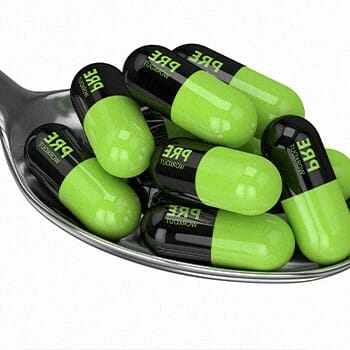The safety of taking pre-workout supplements on an empty stomach has been the subject of countless debates in the fitness world.
Many people say this practice causes no harm, while some warn against doing so.
To clear up the confusion, I pored through tons of scientific journals and articles to find out what the experts really say about it.
Here's what I learned.
Quick Summary
- You can take pre-workouts on an empty stomach, in order for them to kick in much faster.
- Individuals with digestive or blood sugar-related complications should consult their doctors before taking pre-workouts on an empty stomach.
- Research from the National Institutes of Health (NIH) shows L-citrulline also amps up muscle power and strength.
- Based on my experience, while fasted training can be effective, it's crucial to listen to your body and adjust your pre-workout routine accordingly, especially when training on an empty stomach.
Should You Workout On An Empty Stomach?

Before answering whether it's okay to take pre-workout on an empty stomach, we first need to ask ourselves: is working out on an empty stomach even advisable?
From my years as a fitness coach, I've seen that working out on an empty stomach can indeed burn more fat, aligning with scientific findings.
When there is zero food caloric energy available, your body turns to stored fat to give you energy, helping you engage in a high-intensity workout even when you're in an overnight-fasted state.
However, doing so can also lead your body to burn muscle for fuel in addition to fat [1]. Although the percentage of muscles burned during this process is comparatively small, it can still be a roadblock to the success of any weight loss program.
Also, exercising on an empty stomach can lead to heightened muscle catabolism—also known as protein breakdown—and lethargy.
But, in general, training in a fasted state—with most of the fast occurring during sleep—will likely give you its fat-burning and weight loss benefits without totally depleting your energy during your workout.
How Taking Pre-Workout On An Empty Stomach Affects Your Body

Taking your pre-workout on an empty stomach is totally fine. Actually, the main difference between taking it before or after eating is just how fast it kicks in.
From what I've seen with clients, those who go for pre-workout on an empty stomach feel its effects faster, which makes sense scientifically. Without food in the way, pre-workout zips into your intestines and bloodstream quicker.
But, if you've eaten recently, no sweat—your pre-workout will still jazz up your exercise game. Just give it 30 minutes to an hour post-meal before hitting the gym to let the magic happen.
According to insights from Healthline, don’t forget that experts recommend that you eat meals rich with all 3 macronutrients (protein, fats, and carbs) after working out to recover faster [2].
Any Side Effects?

In my time training clients, I've noticed that while most pre-workouts are safe on an empty stomach, individual reactions can vary, so it's always best to start with a small dose.
As I’ve mentioned, the only effect will be quicker absorption in the bloodstream.
However, there are a few potential side effects you should keep in mind.
Low blood sugar
If you have a blood sugar-related condition like hypoglycemia, your glucose level—which is your body's primary energy source—is lower than normal.
When a person with this condition goes for several hours without eating, they might end up feeling dizzy, weak, and nauseous. And if you take a pre-workout supplement on top of these symptoms, you'll definitely feel worse.
So if you're at risk of hypoglycemia, it's best to have a small snack before starting your workout session.
Digestive problems
Another possible side effect of taking a pre-workout drink on an empty stomach is digestive system irritation.
That’s because most pre-workouts contain artificial sweeteners, caffeine, and other stimulants known to cause gastric distress.
So if you’re someone with a sensitivity to synthetic sweeteners, caffeine, and other stimulants, you should eat before you take your pre-workout to prevent any stomach issues from happening.
Best Pre-Workout Ingredients For Training On An Empty Stomach

Drawing from my experience with various clients, while most pre-workout ingredients are safe for fasted training, some can cause discomfort, so it's important to choose wisely.
Even while working on an empty stomach, putting a priority on pre-workout supplements with these essential nutrients might help you maximize your workout performance.
If you plan to incorporate intermittent fasting or fasted training into your exercise regimen, here are the superior pre-workout supplements to go for.
L-Citrulline + L-Glutathione
Nailing that “muscle pump” hinges on good circulation, and for that, you need enough nitric oxide (NO) in your system. The combo of L-citrulline and L-Glutathione boosts NO synthesis, relaxing blood vessels and pumping up blood flow.
Research from the National Institutes of Health (NIH) shows L-citrulline also amps up muscle power and strength [3]. Though it's more effective at elevating NO than L-arginine supplements, its solo impact is iffy due to poor bioavailability.
Per a 2015 study published in the National Center for Biotechnology Information (NCBI), without breaking your fast, these two substances may help support NO activity, improving your lean muscle growth and workout power at the gym [4].
Creatine
Creatine is an organic compound stored in muscle tissue as fuel for ATP energy production. It is favorite among many fitness enthusiasts because it’s a natural method of improving workout strength, energy, and physical performance.
Although it doesn’t give the instant “feel good” effect of caffeine, the reason it’s so popular is the numerous benefits it provides.
Here are some of them:
- Stimulates insulin-like growth factor 1, resulting in muscle growth, development, and recovery [5].
- Replenishes ATP energy levels exhausted during high-intensity exercise, helping you sustain exercise endurance and improve your gym performance [6].
- Buffers lactic acid within the muscles to help lengthen muscle exertion to failure, thereby enhancing workout endurance [7].
BCAAs (Branched-Chain Amino Acids)
The aminos that can best support lean muscle mass growth is BCAAs, amino acids known to boost protein synthesis while protecting your muscles against the protein-depleting effects of exercise. BCAAs quickly absorb into the muscles and provide several performance-enhancing benefits:
- Prolongs workout energy and endurance
- Blocks neurotransmitters that cause fatigue
- Stimulates insulin for improved amino acid uptake
- Supports the synthesis of growth hormones in the body
- Preserves lean muscle mass while diminishing soreness
You can take a BCAA supplement either before going to the gym or during exercise.
Why Did My Pre-Workout Stop Working?
“We sense this change very dramatically the first few times it happens, but then we become accustomed to the feeling, so subsequent uses of the very same product at the very same dose will feel ‘less’ in terms of magnitude of effect.”
- Shawn Talbott, Ph.D., L.D.N., Nutritional Biochemist
To prevent this “dulling sensation”, take a break from your pre-workouts for a few days or switch to a different formula. Mixing up your pre-workout routine helps too. Try new exercises, tweak your training intensity, or try different physical activities to shake things up.
By switching up your pre-workout game, you keep your body on its toes, maximizing performance and maintaining the perks of your supplements.
Related Article: Is It Bad to Drink Pre-Workout Without Working Out?
References:
- https://www.sharp.com/health-news/should-you-work-out-on-an-empty-stomach
- https://www.healthline.com/nutrition/eat-after-workout
- https://pubmed.ncbi.nlm.nih.gov/10442090/
- https://www.ncbi.nlm.nih.gov/pmc/articles/PMC4472409/
- https://pubmed.ncbi.nlm.nih.gov/18708688/
- https://pubmed.ncbi.nlm.nih.gov/12701817/
- https://pubmed.ncbi.nlm.nih.gov/23164647/
- https://www.mensjournal.com/food-drink/why-isnt-my-pre-workout-supplement-working-anymore
About The Author
You May Also Like






